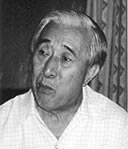
Gyalo Thondup, the elder brother of His Holiness the Dalai Lama
Thondup, who is currently in Hong Kong, said he began his Tibet visit on July 3, 2002, and went to Lhasa, Kongpo Nyingtri, Lhoka, Samye, Tsethang, Gyantse and Shigatse in 13 days. Between July 14 and 22, he visited Xinning, Kumbum, Tso-ngon, Tsakhalo, Golmud, as well as his birthplace in Amdo. Thereafter, he spent seven days in Eastern Turkestan (Xinjiang) before going to Beijing.
When asked whether he was able to interact with the ordinary Tibetans during his trip, he said he did not get the opportunity to meet at length with them. Thondup said he met with Tibetan leaders like Ragdi and Legchok. He said he had asked the Tibetan officials to stop their denigration of the Dalai Lama.
Thondup said his two main messages to the leaders in Tibet and China were to help preserve Tibetan cultural heritage and permit Tibetans within and outside of Tibet to visit each other. He said the Chinese and Tibetan leaders were receptive to both of these suggestions.
When asked what his impression of the trip was, he said there was a strong desire on the part of the Chinese leaders under Jiang Zemin to change the system in which Tibetans had to take orders from Chinese officials and to give real authority to Tibetans.
He said he was hopeful about Tibet in the long term. Thondup said there were great changes in the minority areas. He said China should respect the rights of the Tibetan nationality as all nationalities have their rights. China should also discontinue unjust practices on Tibetans. Thondup said that if the situation in Tibet becomes better, it could only be to the benefit of China.
Thondup also said that there were great changes in terms of roadway and housing construction. He said the population has increased tremendously. Asked if he noticed many ethnic Chinese he said that many Chinese businessmen were in the bigger towns but not as much in the rural areas.
He said witnessing the situation in Tibet personally is different from hearing what others say. He said that understanding the reality of the situation in Tibet can help avert misunderstandings and is important for both Tibetans and the Chinese.
Thondup said that he did not have any discussions about Tibet-China negotiations because he was on a private visit, but he said face-to-face meetings, including between the Dalai Lama and Jiang Zemin, were essential to resolve the Tibetan problem.
Thondup said he did not meet the boy appointed by the Chinese as the Panchen Lama, as the Dalai Lama did not recognize him.
A caller from Tibet, Tashi Dorjee, who participated in the radio program said not many people knew of the visit. When asked why there was secrecy in his trip, Thondup responded that the Chinese central government had prepared the program.
When asked how his trip came about he said that when visiting China two years ago he had told the Chinese United Front officials about his desire to visit Tibetan areas.
They responded to him in March this year saying it would be good if he visited in July.
Thondup asked the radio to let the Tibetans know that he was planning a more extended visit to Tibet in the future. He said he plans to spend three months: a month each in Amdo, U-Tsang and Kham, the traditional three provinces of Tibet. He said he was not able to visit Kham this time.
When asked whether he would be reporting to the Dalai Lama or the Tibetan Government-in-Exile when he returns to India, Thondup said there was no special plan.
However, he said he will give a detailed response if asked.

